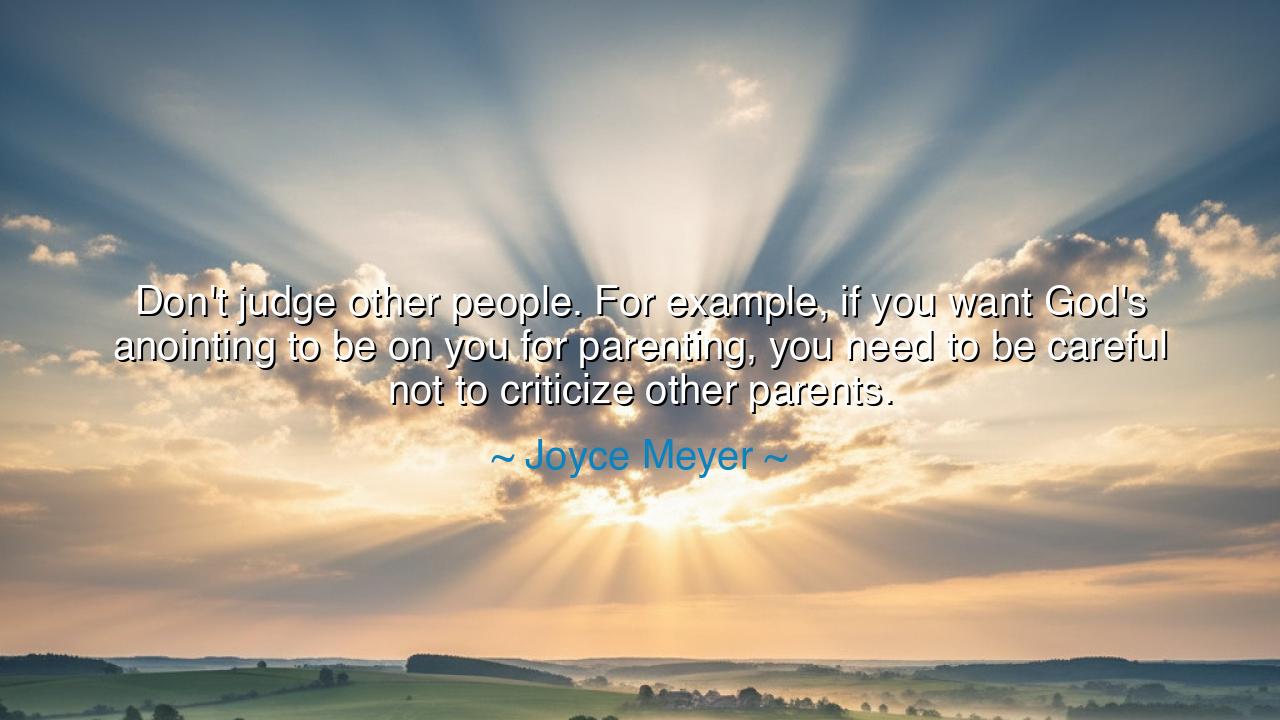
Don't judge other people. For example, if you want God's
Don't judge other people. For example, if you want God's anointing to be on you for parenting, you need to be careful not to criticize other parents.






The words of Joyce Meyer resound with a sacred admonition: “Don’t judge other people. For example, if you want God’s anointing to be on you for parenting, you need to be careful not to criticize other parents.” Here we hear the echo of ancient wisdom, carried down from prophets and teachers of old: that judgment of others blinds the soul, while humility opens it to grace. In the realm of parenting, where every path is heavy with trial and no two children are alike, this teaching is especially urgent. To condemn another parent is to forget the weight of our own burden, and to cut ourselves off from the divine mercy we so desperately need.
The ancients taught that the one who mocks his neighbor’s struggles will soon stumble upon his own. For the journey of parenting is like crossing a desert: some carry heavy loads, some faint beneath the sun, some lose their way in the dunes. Who among us, seeing another falter, would be so cruel as to laugh or scorn? Joyce Meyer calls us to remember that if we desire God’s anointing—that unseen blessing that strengthens weary hands and comforts aching hearts—we must cultivate compassion, not criticism.
History offers us an enduring lesson in the story of Hannah, the mother of Samuel. For years she was mocked and judged for her barrenness, as if she were less than a woman, less than a potential mother. Yet in her sorrow she did not lash out, but turned her heart toward God. In time, she bore Samuel, who became one of Israel’s great prophets. The mockers were silenced, and Hannah’s humility was exalted. This story reveals the danger of judging others in matters of parenting—for what appears to us as failure may, in time, be revealed as the preparation for greatness.
Meyer also reminds us that criticism is poison, not only to those we wound with our words, but also to ourselves. A parent who spends their breath condemning another cannot hear the quiet guidance of heaven for their own household. Pride deafens the spirit, while humility opens the heart. If we long for divine wisdom in our parenting, we must resist the temptation to boast of our ways as superior, or to despise others for walking differently.
There is also wisdom here for the community. For when parents judge one another, division grows, and the burden of raising children becomes heavier. But when parents encourage one another, when they lift up instead of tear down, they form a circle of strength. The ancients knew that the village raises the child, and the village survives only when its people guard one another’s dignity. In the same way, modern parents must learn to stand together, not in competition but in compassion.
The lesson for us is plain and powerful: do not waste your strength comparing, mocking, or condemning. Instead, tend to your own household with humility, and extend grace to others who are struggling. The hand that helps another steady their load will find its own burden lighter. And the heart that refrains from judgment will find itself more open to receive the anointing—the blessing, the wisdom, the peace—that comes from God.
Practically, this means resisting the impulse to measure your child or your parenting against others. It means choosing words of encouragement instead of criticism when you see another parent stumble. It means remembering that every child carries a story unknown to you, and every parent bears battles invisible to your eyes. And it means asking for grace daily, not only for yourself, but for all who labor in the sacred calling of parenting.
Thus let Joyce Meyer’s words be carried forward as a shield against pride: “Don’t judge other people.” For in humility lies strength, and in compassion lies blessing. To honor other parents is to honor God’s work in them, and to open yourself to His work in you. And when parents walk in this spirit, they will find that they are not competitors, but fellow travelers, raising the next generation together beneath the watchful eyes of heaven.






AAdministratorAdministrator
Welcome, honored guests. Please leave a comment, we will respond soon